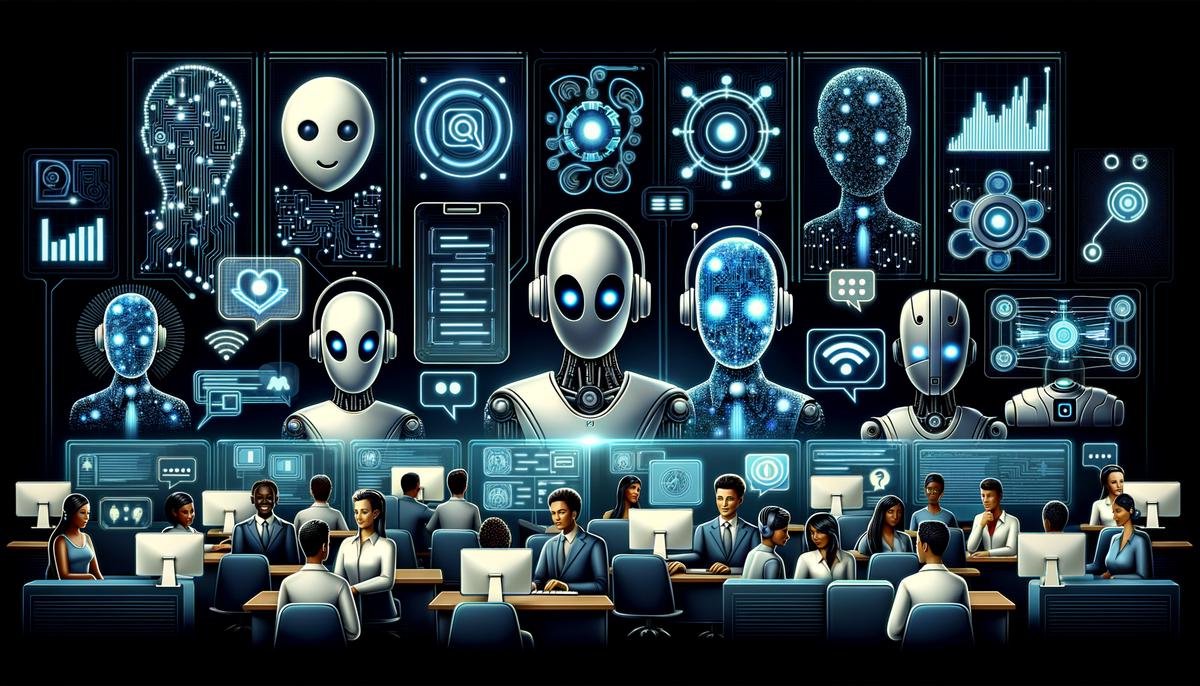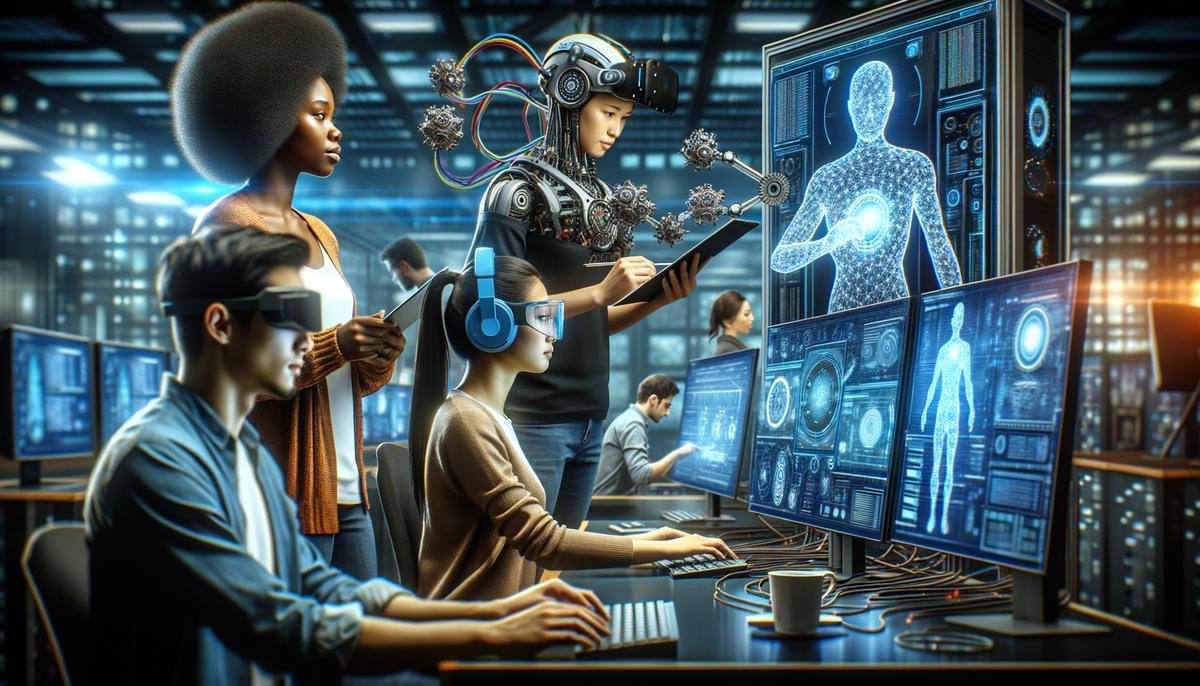Impact of AI on Job Categories
Artificial intelligence and automation are rapidly reshaping the landscape of employment across various sectors, with the potential for significant disruption in job categories such as customer service, office support, and certain white-collar professions. These sectors are particularly vulnerable because many of their tasks can be standardized and are therefore easy targets for AI solutions.
In customer service, AI can handle routine inquiries through chatbots that interpret and respond to customer queries, often more efficiently than human employees. This is due to AI’s ability to operate continuously without breaks and its capacity to learn from vast amounts of data, thus improving its responses over time.
Office support jobs are also at high risk as AI technologies such as natural language processing and machine learning enhance their capabilities in handling administrative tasks like scheduling, email management, and document preparation, which traditionally required human involvement. The technology’s ability to automate repetitive tasks accurately and efficiently makes it ideal for such roles.
AI’s impact extends to certain white-collar professions where decision-making can be based on data analysis. Jobs in fields like accounting and financial analysis may see substantial transformations as AI systems undertake tasks involving data analysis and pattern recognition.
More complex implications of AI include its role in decision-making processes, which involves not just analyzing historical data but also predicting future trends. For professions that rely heavily on data interpretation, like market analysis, the introduction of AI can shift the skill sets required, with an increasing emphasis on oversight and strategy that complements AI’s analytical capabilities.
Transportation and logistics are another area undergoing profound change. AI’s optimization capabilities are applied in routing and load management, which can streamline operations and lower costs, potentially impacting jobs related to fleet management and operational scheduling.
However, the transition may open new opportunities for jobs that involve designing, maintaining, and improving AI systems. Workers will need skills focused on the interplay between AI and human decision-making, blending technical knowledge with strategic oversight capabilities.
Education and ongoing training will become crucial as the workforce shifts to roles that manage and work alongside AI, emphasizing adaptability and continuous learning. The transformation pushed by AI isn’t just about displacement but also about evolution within job sectors, offering opportunities for both emerging and existing professionals to adapt to new technological norms.

AI’s Role in Creating New Job Opportunities
The emergence of AI is not solely about the displacement of jobs but equally about the birth of new roles that harness the capabilities of AI for innovative purposes. As industries integrate sophisticated AI systems, new job categories are becoming essential, specifically in areas like AI maintenance, development, and decision support systems.
In AI development, there is a growing demand for machine learning engineers and data scientists. These professionals focus on building AI models that can learn from and make decisions based on large data sets. They apply their expertise in computer science and statistics to improve the accuracy of machine learning algorithms and ensure these systems can operate effectively within different operational frameworks.
AI maintenance revolves around roles that ensure AI systems function smoothly and reliably. As AI technologies are deployed in diverse environments—from self-driving cars to automated financial advisors—specialists are needed to monitor, update, and repair AI systems. This involves an understanding of both the technology and the specific applications it serves.
Equally critical are the positions emerging in AI-driven decision support systems. Professionals in this niche help bridge the gap between AI outputs and human decision-making. They specialize in understanding and interpreting AI analyses for business leaders or policymakers to take well-informed actions. For instance, an AI business integration specialist might work with marketing teams to interpret consumer data analyses crafted by AI, devising strategies that leverage these insights to boost sales or customer engagement.
The skills required for these emerging roles extend beyond traditional IT expertise to include multidisciplinary knowledge. Cognitive flexibility, problem-solving in tech-driven contexts, and managing AI-human interactions are becoming fundamental. Ethical considerations like bias mitigation and AI transparency are crucial areas where professionals need to be knowledgeable.
Future professionals will undoubtedly encounter a workplace where interacting with, managing, or even being augmented by AI systems will be commonplace. This technological evolution encourages a mindset of lifelong learning and adaptability, essential for navigating the ever-shifting landscape where AI not only shifts but also shapes job opportunities.

Workforce Transition and Skill Development
The need for reskilling and upskilling in an AI-driven economy is becoming increasingly critical as the landscape of employment undergoes rapid transformation. As AI technologies automate routine and some complex tasks, educational institutions have a pivotal role to play in preparing the current and future workforce to thrive in new, AI-augmented job roles.
Educational institutions, from universities to vocational schools, must pivot their curricula to incorporate training that focuses on the skills necessary for an AI-infused job market. These programs must cater to a diverse array of subjects spanning from technical skills, like programming and AI model management, to soft skills such as critical thinking, ethical reasoning in technology contexts, and adaptive problem-solving. The objective is to create a hybrid skill set that integrates domain-specific knowledge with an understanding of AI applications.
For those already in the workforce, ongoing corporate training and development programs are vital in ensuring employees remain competitive and proficient in their roles. Companies can collaborate with higher education institutions or specialized training providers to create customized learning pathways that address specific skills gaps.
Incorporating AI education early in academic journeys is essential. Schools should integrate principles of AI and data literacy from primary levels onward to nurture a comfort and familiarity with technology. This exposes students to the practical and ethical dimensions of AI, preparing them for more advanced studies and application in later academic and professional pursuits.
Continuous learning programs are also set to become the norm in maintaining workplace relevance. With AI continually advancing, professionals will need to engage regularly with new learning modules. Encouraging a culture that values lifelong learning is key, embracing online platforms that offer courses on the latest AI advancements alongside foundational courses that solidify understanding of the broader implications and applications of AI technology.
Governments also play a significant role in workforce transformation. By funding initiatives that reduce the cost barrier of upskilling programs and by providing incentives for institutions to modernize curricula, they can accelerate the transition to an AI-adept workforce. Public policies should focus on equity to ensure that all segments of the population have access to necessary education and training.
As we push forward into a more AI-integrated world, the emphasis must not only be on developing new skills but also on redefining how we think about education and employment in a digitally transformed landscape. This holistic approach will empower professionals to actively shape and lead in an AI-driven world, ensuring that they are not left behind by technological progress but are instrumental in steering it effectively.

Ethical Considerations and Worker Rights
As artificial intelligence becomes deeply integrated into workplace environments, addressing the ethical implications is as crucial as embracing the technology itself. AI systems, though improving efficiency and decision-making, present challenges related to privacy, surveillance, and potential biases, demanding solutions to protect worker rights and maintain ethical standards.
One of the primary concerns with AI in the workplace is privacy. Employers employing AI for productivity monitoring can inadvertently infringe on employee privacy. AI-driven monitoring systems that track keystrokes or use cameras can collect excessive amounts of personal data, beyond what is necessary for performance assessments. This strikes a challenging balance between keeping an eye on productivity and respecting employees’ personal spaces and autonomy.
Surveillance, increasing under the guise of optimizing operations, also advances the risk of overreach into employees’ personal lives. The efficiency gained from AI-driven insights must be weighed against the need for a workplace that respects individual liberty and offers freedom from invasive observation, creating an atmosphere of mutual trust.
AI can also perpetuate existing biases if not carefully managed. AI systems learn from vast amounts of data which can contain historical biases. When used in recruiting, for instance, AI might develop prejudiced hiring practices based on skewed datasets, reinforcing workplace homogeneity and discrimination. Hence, ensuring AI models are trained on balanced, diverse data is crucial to averting algorithmic bias.1
As automation reshapes industries, labor laws likewise need revisions to safeguard worker rights in this new digital era. Legislation might have to define new rights and regulations regarding the transparency of AI-driven decisions in the workplace, particularly concerning how data influencing these decisions is handled. Workers should have the right to know if and how AI is being used in evaluating their performance or making decisions that affect their professional lives. Furthermore, there should be clear procedures for contesting and auditing AI decisions believed to be unfair or discriminatory.
With the rise of AI and robotics, workplace safety regulations need adaptation. Current laws are tailored to human capacities and risks. They need to evolve to encompass the additional hazards introduced by working alongside machines.2
To formalize these necessities into practical strategies, collaborative efforts between government bodies, tech developers, corporate stakeholders, and worker representatives are essential. Stakeholders must work cohesively to establish guidelines that ensure technological advancements in AI harmonize with fundamental worker protections and ethical norms.
Venturing toward this future requires an integral, global conversation focused on constructing a fair, inclusive, and equitable framework that respects both the capabilities of AI and the indispensable value of human integrity in the workforce. Thus, setting a path involves ensuring that technological progress serves humanity’s broader interests, fortifying not just economies but the social fabrics that underpin societies.

- Mehrabi N, Morstatter F, Saxena N, Lerman K, Galstyan A. A survey on bias and fairness in machine learning. ACM Computing Surveys (CSUR). 2021;54(6):1-35.
- De Stefano V. ‘Negotiating the algorithm’: automation, artificial intelligence and labour protection. Comp Lab L & Pol’y J. 2019;41:15.




